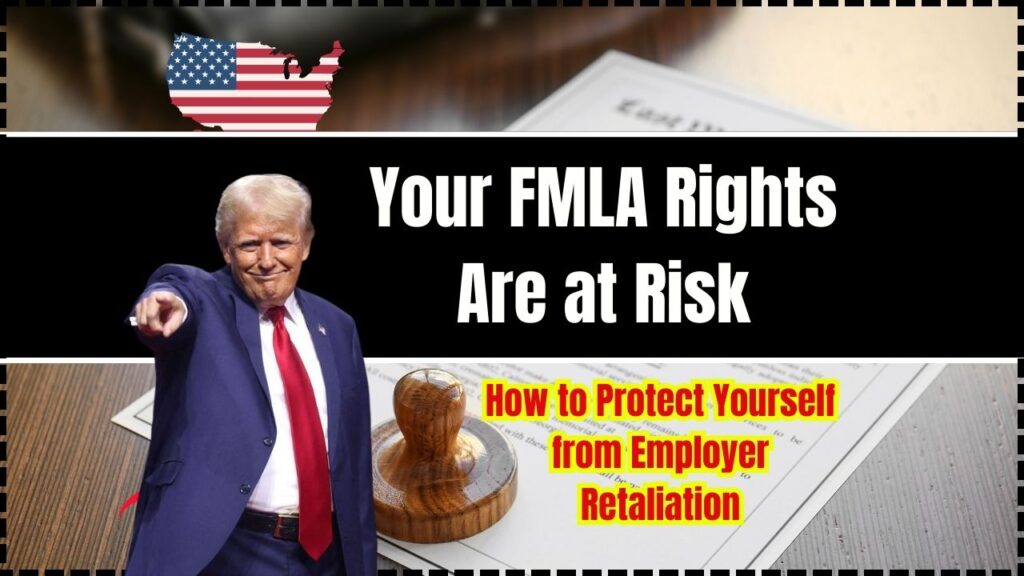Your FMLA Rights Are at Risk: Balancing work and personal health or family responsibilities can be challenging. The Family and Medical Leave Act (FMLA) is a crucial federal law that provides eligible employees with the right to take unpaid, job-protected leave for specific family and medical reasons. However, despite these protections, some employees face retaliation from their employers after exercising their FMLA rights. Understanding how to safeguard yourself against such actions is vital for maintaining your job security and overall well-being.
Your FMLA Rights Are at Risk
Your FMLA rights are not just protections—they are legal guarantees. If you’re facing personal or family challenges, you deserve the ability to step away from work without fear of punishment. By staying informed, documenting your journey, and standing up for your rights, you can confidently navigate the FMLA process and defend yourself against retaliation. Whether you’re a first-time caregiver or a seasoned professional, never underestimate the power of preparation and legal knowledge. If you suspect FMLA violations, take action early. Your job, peace of mind, and family well-being depend on it.

| Aspect | Details |
|---|---|
| FMLA Overview | Provides eligible employees with up to 12 weeks of unpaid, job-protected leave for specific family and medical reasons. |
| Eligibility Criteria | Employed for at least 12 months, worked 1,250 hours in the past year, and work at a location with 50+ employees within 75 miles |
| Common Retaliation Forms | Termination, demotion, pay reduction, negative performance reviews, and hostile work environment. |
| Protective Measures | Document interactions, understand rights, report concerns, and seek legal counsel if necessary. |
| Legal Remedies | Reinstatement, back pay, front pay, liquidated damages, and coverage of attorney’s fees. |
| Official Resource | U.S. Department of Labor – FMLA |
Understanding the Family and Medical Leave Act (FMLA)
Enacted in 1993, the FMLA allows eligible employees to take up to 12 weeks of unpaid, job-protected leave within a 12-month period for specific family and medical reasons, including:
- The birth and care of a newborn child.
- Adoption or foster care placement of a child.
- Caring for an immediate family member (spouse, child, or parent) with a serious health condition.
- A serious health condition that makes the employee unable to perform their job duties.
Employers are required to maintain health benefits during the leave and must restore the employee to their original or an equivalent job upon return.
Recognizing Employer Retaliation
FMLA retaliation happens when an employer punishes an employee for taking or requesting protected leave. Retaliation may include:
- Being fired or laid off
- Pay cuts or demotion
- Negative performance reviews
- Sudden disciplinary actions
- Isolation or exclusion from team activities
These actions may be subtle or overt. If they begin shortly after your FMLA request or leave, they could signal unlawful retaliation.
Steps to Protect Your FMLA Rights Are at Risk
1. Document Everything
Keep detailed records of your leave request, approvals, emails, performance reviews, and any suspicious treatment before or after your leave.
2. Know Your Rights
Visit DOL’s FMLA Page to read up on your rights. Awareness is your first defense.
3. Report Internally
If you believe retaliation is occurring, speak with HR or your employer’s compliance department. Present your concerns calmly and professionally, backed by documentation.
4. Consult a Legal Expert
Reach out to an employment attorney, especially if internal channels fail to resolve the issue. Legal professionals can help you file a complaint with the U.S. Department of Labor or initiate a lawsuit if needed.
Legal Remedies Available to Employees
If you’re a victim of FMLA retaliation, you may be entitled to:
- Reinstatement to your job
- Back pay for wages and benefits lost
- Front pay if reinstatement isn’t feasible
- Liquidated damages (often equal to your back pay)
- Attorney’s fees and court costs
You must file an FMLA complaint within two years (three for willful violations). Begin by contacting the Wage and Hour Division of the DOL.
Case Study: A Real-Life Example of Retaliation
In 2025, a Michigan woman, Terri Estepp, claimed she was terminated after using FMLA leave to care for her terminally ill daughter. After requesting an extension, her employer allegedly fired her the same day. The case garnered national attention and highlighted the importance of FMLA protections.
FMLA Violations Exposed: Major Companies Face Lawsuits in 2025
Employer’s Handbook: Ensuring FMLA Compliance Amid Recent Regulatory Changes
Top 5 Mistakes Employees Make When Requesting FMLA Leave and How to Avoid Them
Frequently Asked Questions About Your FMLA Rights Are at Risk
Q1: Can I be fired while on FMLA leave?
No, you cannot be fired because you took FMLA leave. However, you can be let go for unrelated, legitimate reasons, such as company-wide layoffs or misconduct.
Q2: How do I know if my employer is retaliating?
Watch for sudden changes in treatment—discipline, exclusion, or demotion—especially after you request or return from leave.
Q3: What should I do if I suspect retaliation?
Report it immediately to HR. If the issue persists, consult an employment attorney or file a complaint with the DOL’s Wage and Hour Division.
Q4: Does FMLA leave have to be taken all at once?
No. You can take leave intermittently if medically necessary, such as a few hours or days per week.
Q5: Is FMLA paid or unpaid?
FMLA leave is unpaid. However, you may use accrued paid leave (sick, vacation) during your FMLA time.







